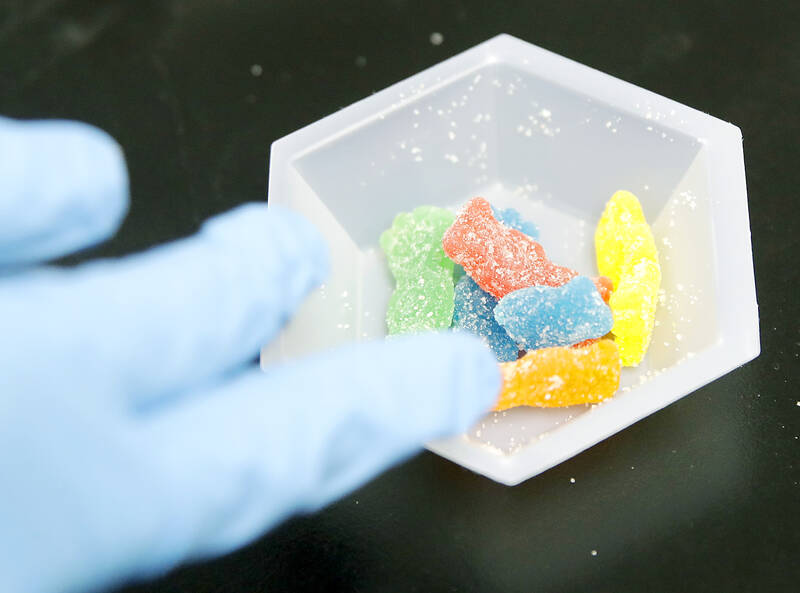The number of American children accidentally ingesting cannabis edibles has risen nearly 15-fold in the past few years as more states have legalized the recreational use of marijuana, a scientific study published on Tuesday showed.
In 2017, just more than 200 children aged five or younger consumed a food product infused with cannabis, a tally kept by health officials showed, compared with more than 3,050 cases in 2021, the study in the medical journal Pediatrics said.
Often sold in the form of candy, chocolate or cookies, edibles look appealing to children, but can cause serious harm because of the patients’ low weight.

Photo: AP
While no deaths were reported in about 7,000 cases of such ingestions by children over the five-year period of the study, about 8 percent of children required admission to intensive care, while nearly 15 percent were hospitalized.
The median age of the affected children was three.
The children’s symptoms included depression of the central nervous system, including falling into a coma, tachycardia and vomiting. They were usually treated with intravenous fluids.
When the study began in 2017, recreational marijuana was legal only in eight US states plus Washington, compared with 18 states at the end of May last year.
“These increases are believed to be associated with more states allowing adult, recreational use of cannabis,” the authors of the study wrote.
With more than 90 percent of ingestions occurring at home, researchers called for educating caregivers on the need to store cannabis products in locked containers in a location unknown to children.
“Not only should cannabis products be placed in child-resistant packaging, but they should be in opaque packages with simple labels,” the authors wrote. “In addition, there should be clear warning labels on the product cautioning against excessive use.”
Some US states, including California, have already implemented such measures, but there are no nationwide laws regarding how cannabis products are packaged.

With much pomp and circumstance, Cairo is today to inaugurate the long-awaited Grand Egyptian Museum (GEM), widely presented as the crowning jewel on authorities’ efforts to overhaul the country’s vital tourism industry. With a panoramic view of the Giza pyramids plateau, the museum houses thousands of artifacts spanning more than 5,000 years of Egyptian antiquity at a whopping cost of more than US$1 billion. More than two decades in the making, the ultra-modern museum anticipates 5 million visitors annually, with never-before-seen relics on display. In the run-up to the grand opening, Egyptian media and official statements have hailed the “historic moment,” describing the

‘CHILD PORNOGRAPHY’: The doll on Shein’s Web site measure about 80cm in height, and it was holding a teddy bear in a photo published by a daily newspaper France’s anti-fraud unit on Saturday said it had reported Asian e-commerce giant Shein (希音) for selling what it described as “sex dolls with a childlike appearance.” The French Directorate General for Competition, Consumer Affairs and Fraud Control (DGCCRF) said in a statement that the “description and categorization” of the items on Shein’s Web site “make it difficult to doubt the child pornography nature of the content.” Shortly after the statement, Shein announced that the dolls in question had been withdrawn from its platform and that it had launched an internal inquiry. On its Web site, Le Parisien daily published a

China’s Shenzhou-20 crewed spacecraft has delayed its return mission to Earth after the vessel was possibly hit by tiny bits of space debris, the country’s human spaceflight agency said yesterday, an unusual situation that could disrupt the operation of the country’s space station Tiangong. An impact analysis and risk assessment are underway, the China Manned Space Agency (CMSA) said in a statement, without providing a new schedule for the return mission, which was originally set to land in northern China yesterday. The delay highlights the danger to space travel posed by increasing amounts of debris, such as discarded launch vehicles or vessel

RUBBER STAMP? The latest legislative session was the most productive in the number of bills passed, but critics attributed it to a lack of dissenting voices On their last day at work, Hong Kong’s lawmakers — the first batch chosen under Beijing’s mantra of “patriots administering Hong Kong” — posed for group pictures, celebrating a job well done after four years of opposition-free politics. However, despite their smiles, about one-third of the Legislative Council will not seek another term in next month’s election, with the self-described non-establishment figure Tik Chi-yuen (狄志遠) being among those bowing out. “It used to be that [the legislature] had the benefit of free expression... Now it is more uniform. There are multiple voices, but they are not diverse enough,” Tik said, comparing it